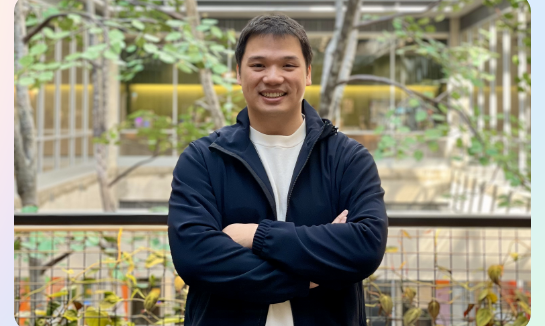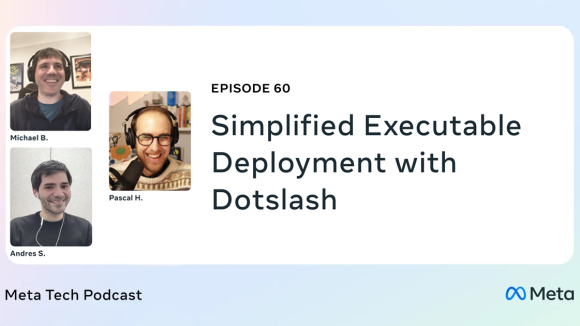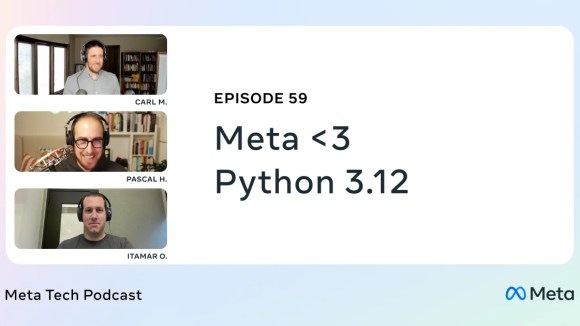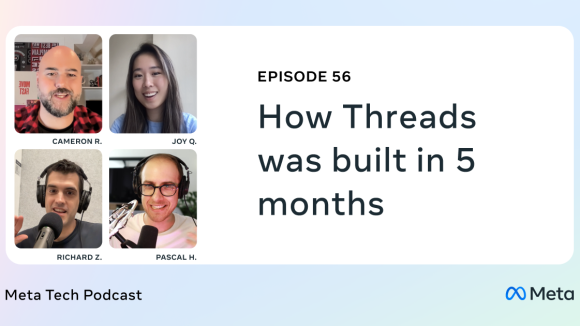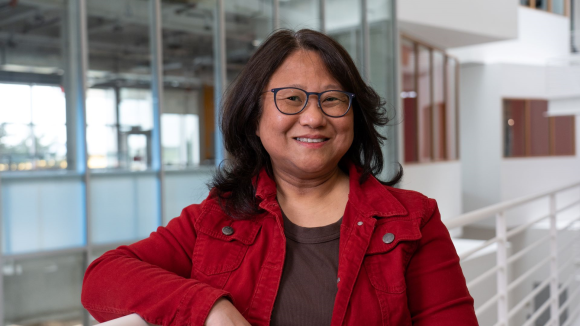As more and more people from underrepresented groups lift their voices and launch their careers in tech fields, it is more important than ever that we share their stories widely. We all need visible role models who can challenge, inspire, and motivate us.
With this in mind, we’re starting the #bewhoyoucansee series. Every week, we’ll profile someone from an underrepresented group working in tech to learn how they got started, what they’re passionate about, and what advice they have for other people pursuing a technical career.
If you’re a role model, or want to share who and what inspires you, follow along with us on Facebook and Instagram by tagging your posts #bewhoyoucansee.
Week Two: Larry Schrof, legally blind Production Engineer
When did you first know you were interested in tech?
I was three years old and playing across the street at my best friend’s house. He said he had a surprise to show me that his family had just purchased. He turned on the TV and I was greeted with this fascinating, glowing electronic image on the screen. It was a maze with cars twisting and turning through it, shooting little blobs at each other.
It was an Atari 2600 – the game was called ‘Slot Racers,’ and I was hooked. My parents got me an Atari that year, and I was hooked on gaming and game puzzles. Already at age three, I knew that somehow, a glowing screen and solving problems was in my future.
At what point did you start figuring out how computers work?
A few years later, my same friend got a Commodore 64. We played on it constantly. I begged my parents for one. You have to understand – this was the early 80’s. We lived in a small town. My parents had never really heard of home computers. They thought it was a bit odd of a request. But I was a good kid and I desperately wanted one, so the next Christmas morning I woke up to my C64 sitting under the tree. Still one of the best days of my life.
After hooking it up, my sister (who is a genius) immediately figured out how to start entering commands into the Basic prompt. Since I am legally blind, she knew I was fascinated by color. She figured out how to start displaying text and characters in lots of different colors, and drew pictures on the screen. I was now helplessly hooked for life.
Electronic bulletin boards, much less the Internet, weren’t available to consumers back then, especially living in the middle of nowhere. But once every three months, our elementary school teachers passed out a catalog of books and magazines we could order. Sure enough, there were always one or two books that were nothing but lots of Basic programs. You typed what you saw in the book into your computer. Then you had a game you could run and play. Sometimes you had a useful utility, but more often than not, it was games.
So that’s how I learned my first programming language – by example. I often didn’t like certain features of the games, so I would figure out how to hack them to make them more interesting. Eventually, once I got experienced enough, I would start writing my own advanced games. (At this point, I was probably nine years old or so.)
What challenges did you face as a legally blind kid working with computers?
The first challenge due to my vision impairment was the size of the television my computer was hooked up to. My parents graciously allowed me to connect it to our main television, which was probably 25″ or so. (This was a big TV by early 80’s standards.) So I had to learn to sit really close to the TV, which kind of freaked my mom out. I also tended to slouch – all the time, so I could get closer to the screen. At one point I had to be tested for scoliosis.
The other problem was the size of print in the books. It wasn’t tiny, but you have to understand, here’s how it worked. You’d turn on the computer. You’d open up the book of program listings on the table. You’d read from the book, and you typed into the computer.
Now, if I put the book between myself and the TV, I was too far away to see the TV. But if I put the book off to the side, I was constantly trying to memorize one line, then look to the keyboard and the TV, and try to type in that line before I forgot it. My eyesight just wasn’t good enough to read-type-repeat; it was very slow going.
Somehow I stumbled on the idea of dictating the entire listing into a cassette tape recorder. This would require perhaps 2 hours or more of continuous dictation, as these programs could easily be thousands of lines long. (Looking back, it amazes me what patience and discipline I had as an 8-year-old to sit there for hours dictating and entering code.) Once I had the dictation done, I would rewind the tape(s), press play, and type in what I heard. I even had to make up words for all the crazy punctuation and symbols you see in code.
Without realizing it, I had already entered into my life-long endeavor of overcoming obstacles to my disability. In fact, I wasn’t a kid who was all depressed thinking, “It really sucks that I’m mostly blind and it really keeps me from doing all this stuff.” Rather, I was thinking, “I have made up my mind that I really want to do this programming thing. What can I do to get around this annoying problem of not being able to see well?” The eye specialist always told my parents, “Never tell him he can’t do anything because of his vision.” They heeded that advice, and it paid off. I was always focused on solutions, not problems.
What was your path through school and then to Facebook?
For high school, I attended the small town’s only high school, but it was a very good one with excellent extra-curriculars to get involved with. Unfortunately, there was no computer club. Fortunately, I became best friends with this great guy named Landon. He was further along in technology than I was, and we both loved programming in our spare time. We’d call each other up on the phone and talk through bugs out loud and offer suggestions on how to fix each other’s code. He taught me a lot about PC hardware among other things.
For college, I attended the University of Illinois at Urbana Champaign, and majored in Computer Science. I’ll never forget one night the summer before my freshman year. My Dad and I were shooting baskets during an amazing sunset, and he started up a conversation with me about my upcoming college life.
You see, I was a mostly-blind kid who couldn’t drive, about to head down to a 6-square-mile college campus with * 70,000 * students and faculty. I was going from a protected, insulated environment and small town of population 6,000 into a giant world with no advocate. I’ll never forget what my Dad said, especially being that we never had that many heart-to-heart chats growing up.
He said, “Look Lar. Don’t worry about your eyesight. If you go down there to school, and for whatever reason it doesn’t work out, that’s okay. It’s gonna’ be hard – a lot of people won’t understand your eyesight – you don’t LOOK blind. And some people just won’t care. But don’t lose heart. Just try your best. You’ve always got a place to come back to, and if it doesn’t work out, we’ll figure something out.” Given that he was a genius engineer in his own right, and held me to very high standards in terms of grades and habits, this was genuinely the nicest conversation he’d ever had with me.
Even more amazing was my reaction to his remarks. I was confused. “Why would college not work out, Dad?” I didn’t consider failure as a possibility. I never have. The scene of me failing out and having to come and live in my hometown – I was physically unable to picture an image of that in my mind.
He was befuddled. “Well… well, it’s going to be hard. I can’t explain how exactly – you’ll see for yourself. Just don’t be afraid to ask for help. From your mom, or from me, or your teachers or friends.”
It turns out, asking for lots of extra help worked out in the end. After undergrad, I worked for the school I attended managing their giant, central Unix email, web, and login cluster. The job itself is called a “systems administrator”, but if you’re not immersed in technology, it’s hard to describe what that is in one sentence.
That was an intense job, and I eventually moved to Chicago to work for Motorola for a year or so. For whatever reason, I decided to start my own consulting company, and found work right away. (Not too shabby for a 24-year old.) I consulted for a few years, and then quit everything I was doing to move out to Boston and go to the Berklee College of Music for a few years. (I majored in Guitar Performance.) After that, I moved back to Illinois, took a technology job at a trading company for a few years, then switched back into consulting for a few more years. I consulted for another great trading company as well as the National Association of Realtors. (I worked in their downtown Chicago HQ building in the IT department, helping them manage all of their Linux infrastructure. They were a great group of folks and I still miss them.)
While consulting for the NAR, on a fluke, I decided to interview for Facebook. I wasn’t sure if I’d even get an offer, much less want to sell my house and move my wife and six-month-old son across the country.
What do you work on now at Facebook?
I work in production engineering–a crucial part of engineering infrastructure that brings together all sorts of knowledge and expertise to help Facebook scale its systems and software while keeping all parts of the site and its infrastructure working 24/7/365. We have to know a lot about a lot: servers, operating systems, programming, compilers, designing fault tolerant systems, networks and their protocols – you name it, we’re into it.
Within production engineering, I recently switched to the ads PE team. We support and improve the infrastructure behind all of the Ads products at Facebook. I’m going to be building lots of useful tools not just for my team, but for all of engineering in general. I also spend a lot of time trying to solve really hard problems related to monitoring at Facebook.
What are you most passionate about outside of work?
I am passionate about my family. My three-year-old son appears to be a tennis phenom of sorts. I’m not talking kind-of-hits-a-tennis- ball. I’m talking he can return volleys over a net, inbounds, no matter where he’s standing on the court. He would hit 500 balls if you let him stay on the court long enough. I want to encourage his love of the sport.
I’m also passionate about music and a martial art called Kuk Sool Won. I play guitar, mallet percussion, and piano. I’m on track to get my black belt in the next six to nine months. I recently won a couple of medals at a west-coast martial arts tournament. Not too shabby for a mostly-blind guy.
What advice do you have for people starting in tech?
-
- Acknolwedge, right this minute, that if you want to be really good, you are going to spend the rest of your life learning. The amount of time you spend learning and experimenting is directly proportional to your overall success in technology.
-
- Get a mentor. Find someone who’s friendly, has time, and has done what you want to do. Ask them questions relentlessly. TAKE THEIR ADVICE WHEN THEY GIVE IT.
-
- Like all subject matter, but especially with technology, there is a massive web of information. Pick an area that really interests you to start – say a particular programming language, or Linux, or networking. Learn all you can in that area. But don’t isolate yourself to one area of knowledge. Try to listen to experts in other areas of technology and learn from them. Talk as often as you can with other engineers about all different areas of technology. You want to be both a specialist and a generalist, if that makes sense.
-
- Install Linux on a computer at home and learn to use it as your day-to-day computing environment. I don’t care what area of tech you are interested in – doing this will improve your understanding of technology ten-fold.
-
- Don’t spend all of your time in front of a computer. Take an art class. Join a band. Go on dates. Get outside a lot. Exercise. A technology career is not a physically active or socially diverse career; you need a balanced life.
-
- Don’t do it for the money, do it for the love. I went to college in the mid 90’s. I watched the Internet become a huge thing, and all these kids entered into computer science as a major thinking they’d have the next billion dollar idea. Then a bunch of them dropped out when they realized how much they hated the material. They were bored. They didn’t love it.
What advice do you have for legally blind people (or others with some form of disability) to accomplish unconventional things?
I am going to speak directly to people out there with any disability, especially those who are interested in getting into technology…
As depressing as this sounds, the World is not going to help you with no effort on your part. No magic fairy is going to come out of the woodwork and stand up for your rights or needs. You need to be your own advocate from Day One. Maybe if you’re in a really small college class the teacher can keep an eye on you and always ask if you need help. But that’s usually not the situation. Usually you’re surrounded by dozens if not hundreds of busy people with busy schedules, all with their own agendas and concerns, including the teachers.
Because of your disability, you are going to have to acknowledge that it will probably take you a lot more work, time, and/or effort to accomplish the same thing that the same person without a disability would require.
Accept this, and then forget about it. In college, for about a third of all of my classes, I also had to pay for and attend a session of private tutoring. I had to ask strangers if I could copy their notes because I couldn’t see well enough to take my own. I had to buy video cameras (they weren’t portable OR cheap in the 90s) and record classes. I had to ask for extended time on exams, backed up by legal documentation that I was entitled to it.
You have to do whatever it takes to get the result you want, even if that means working ten times harder because of your disability. While there are laws and programs in place that have evolved over the past couple of decades to help people with disabilities, 99 percent of the effort is still on your end. Having a disability is not a “card you get to play” for freebies.
Also, habits, whether good or bad, have a magnified effect on someone with a disability. If you tend to be a procrastinator, you are making it twice as hard on yourself compared to someone without your disability. HOWEVER, if you can kick yourself of this habit, the time and energy you free up will be significantly MORE valuable to you than someone without a disability. (Precisely because you spend a lot of time and energy overcoming your disability – that regained time and energy is all the more valuable to you.)
I will say this again. Be nice, and ask for help. Being shy about asking for help if you have a disability is a death sentence. Especially if your disability is not obvious, like mine. (I don’t walk around with a white cane unless I’m crossing a busy street. I’ve had friends who didn’t figure out I was legally blind until they had known me for two years!) I was almost arrested for J-walking by a street cop until I carefully and patiently explained my vision impairment. He scolded me for not having my white cane, and he was totally, 100% right. (I needed both arms free to carry my guitar and amp – I was at music school, and had no ride to where I was going.)
I’ve known a lot of people with disabilities who were permanently angry. They felt that life delt them a raw hand, and they’re upset. They’ve given up hope. And they lead very mediocre lives. Don’t allow yourself to become one of those individuals.
Obstacles will constantly get in your way because of your disability. Your whole life. Every day. Push on. You have to establish the right mental and emotional framework to say, “No problem. What do I want, and how do I get around this obstacle?”
And here’s a counter-intuitive piece of advice. Don’t specifically seek out others with disabilities. You want a broad, diverse social circle. You want to be surrounded by people who know more than you do, and who can do things you can’t. You need inspiration, and a reminder of what life can be like once you overcome your obstacles.
A support network is important, but I’ve noticed something interesting. Whenever I’ve seen groups of people with disabilities getting together, it’s been to talk about their disabilities, what it’s like to have them, and problems they’ve run into. It’s actually kind of depressing, because many times they’re focused on just the problem, and complaining, and feeling sad collectively as a group.
Focus on the solution. Focus on results, not obstacles. Forget your disability. Focus on your abilities.
No matter if you are blind, deaf, mute, paraplegic, in a wheelchair, or have any one of hundreds of mental disabilities, you have valuable things to offer the world. Things the world NEEDS. Things the world WANTS. The world is waiting on you. It’s your move…
And failure is not an option.

